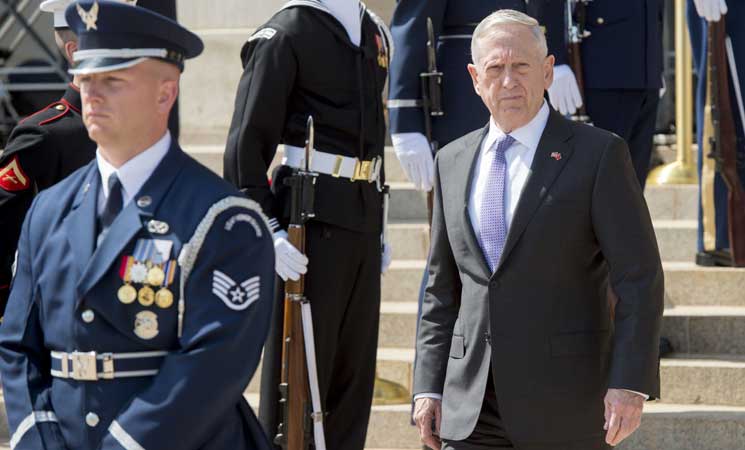WORLDVIEW: Arming against China

By Jonathan Power
Last week, the American Secretary of Defense, Jim Mathis, declared a new era: “There has been a return of great power competition……great power competition- not terrorism- is now the primary focus of US security”. In the new national defense strategy document, China and Russia are singled out as “adversaries”.
Although the US is now spending on defense three times as much as China (1.7% of its GNP as against America’s 3.3%), Mathis is worried that the US’s military advantage over its adversary has eroded “in every domain of warfare”. The military, he said, “was coping with “inadequate resources” and he called for Congress to appropriate it more billions of dollars.
Pro Mathis/Trump analysts are arguing that China could be set on replacing the US as the hegemon of East Asia and will then start projecting military power into other regions, even the West.
They claim that military reinforcement of islands in the South China Seas, the Chinese assertion of airspace ownership above disputed islands in the East China Sea and the increase of threats towards Taiwan are the beginning of this. This has to be checked, they say before it gathers more momentum.
This doesn’t make sense. China has little prospect of enforcing its maritime claims or developing a force capable of conquering Taiwan -its supposed number one ambition since it considers the prosperous island to be part of the mainland.
According to the Chinese military’s strategy documents China would initiate a war with Taiwan by bombarding its air and naval bases, missile batteries and command centers with salvos of ground-and air-launched missiles. Thus it would establish air and sea command in the Taiwan Strait, vital requisites to a successful invasion.
In fact, as Michael Beckley, a fellow of Harvard University, argues in the new issue of the university’s “International Security”, Taiwan could pick off Chinese landing craft as they motored across the Taiwan Strait. Similarly, a sustained bombing campaign would be impossible because Taiwan’s air force and air defenses could decimate Chinese bombers.
In 2000 the Chinese had only a few hundred inaccurate missiles and a few dozen advanced aircraft. Today it has 1,500 accurate missiles pointed at Taiwan and more than 1000 aircraft. If China caught Taiwan off guard it could do immense damage. But it won’t.
Taiwan has also advanced. It has one of the best early warning systems in the world. Its on-the-ground intelligence inside China is sophisticated. If Taiwan saw that an attack was coming it would quickly deploy its navy and disperse its combat aircraft among 36 airfields scattered around the island. Some of these locations have hangers built inside mountains or 6-foot-thick concrete walls. Taiwan’s air defense system has over 500 long range missile launchers.
Would a Chinese blockade be effective? No blockade in the past 200 years has worked. Modern states can adapt to supply shortages and civilian populations are usually willing to endure enormous punishment to defy a foreign enemy.
And what would China gain if, in the unlikely event, it was militarily successful? Unlike in a traditional war, China doesn’t want to obliterate Taiwan’s cities. It wants to rule over the prosperous island. Reducing Taiwan to a smoldering ruin would not achieve this. Moreover, it would push every other neighbor in the region to be much more vigilant and better armed.
China then would be effectively encircled by hostile states- Japan, Philippines, Vietnam, Indonesia, South Korea and Malaysia- a very counterproductive result.
Besides Taiwan, there are two island disputes. The first is with Japan over ownership of the Senkakus/ Diaoyutai islands in the East China Sea. The second is with Vietnam and the Philippines over a string of tiny islands and rocks in the South China Sea.
Japan’s military
 Japan may have renounced war-making in its post-World War 2 constitution but it already has a formidable military. To decimate Japan’s air and naval forces would be a Herculean task. Japan has qualitative superiority and could easily command the East China Sea.
Japan may have renounced war-making in its post-World War 2 constitution but it already has a formidable military. To decimate Japan’s air and naval forces would be a Herculean task. Japan has qualitative superiority and could easily command the East China Sea.
China has a defense budget four times Japan’s but it has more to do than Japan. Japan has to guard against China, but no one else. China has to guard against the West, Russia, Japan and those of its neighbors it chooses to provoke.
Modern China has not been territorially aggressive and given the above why should it start now? What, for example, would be in it for China to use the islands of the South China Sea as an offensive platform?
The US should be going in the opposite direction to the one spelt out by Mathis/Trump. It should decrease its forces that are near Chinese borders. It should not hold provocative war games near China and it should not intrude on Chinese waters which it has in the past.
China should be a friend, Trump keeps saying. But America’s new defense document says the opposite. That circle cannot be squared.





